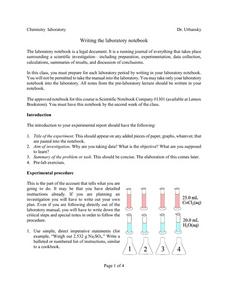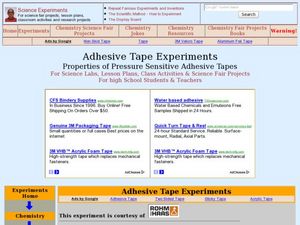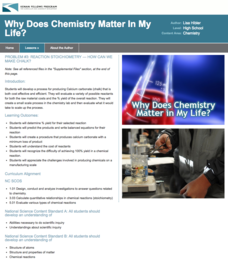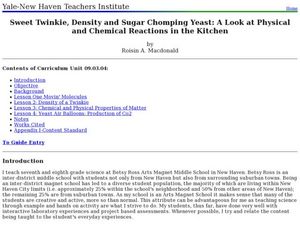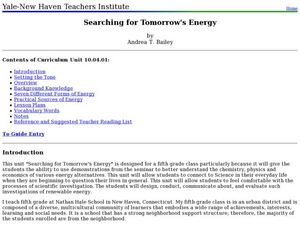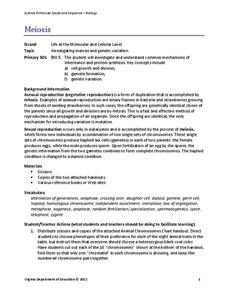Curated OER
Properties and Perfectly Polymeric Sodas
Students examine physical and chemical properties of plastics, interfaces of plastics, and forms of plastics. In three lab activities, students discover the two characteristic responses of plastics to heating, thermoplastic or...
Curated OER
Writing The Laboratory Notebook
In this chemistry worksheet, students examine the given concept in order to apply in the laboratory setting. The sheet includes in depth background information.
Curated OER
Environmental Concerns (1) Analysis of Lead in Paint (2) Analysis of Water
A scenario and background information are provided for two different open-ended experiments that experienced chemistry classes can perform toward the end of the school year. In the first, they design a method for testing flakes of paint...
Curated OER
Bridge Cable Corrosion
Students investigate the corrosion of different materials in the lab. In this chemistry lesson plan, students construct a bridge considering different bridge designs. At the end of the lesson plan, they play the role of scientists and...
Curated OER
Flame Test
Students conduct a flame test on different substances. In this chemistry lesson, students predict the element present based on the color emitted during the flame test. They explain how different elements produce different colors.
Curated OER
"Stick to It!" Properties of Pressure Sensitive Adhesive Tapes
High schoolers investigate the strength of different adhesives. In this physical science lesson, students compare the force needed to peel adhesive tapes from a surface. They analyze collected data and make a generalization.
Curated OER
Graphing Data from the Chemistry Laboratory
Students graph and analyze data using a spreadsheet.
Kenan Fellows
Reaction Stoichiometry—How Can We Make Chalk?
What is a reasonable percent yield in the manufacturing process? Scholars develop a process for producing chalk in the third lesson of a six-part series. Then, they must determine the theoretical and percent yield. Discussions about...
SRI International
Nanofiltration
How can everyone in the world have access to clean drinking water? Throughout the lesson, learners read about and listen to how water is filtered, what the filtration process removes, and the best ways to filter. They explore the...
Curated OER
Determination of Phosphates
Students engage in a laboratory lesson in order to increase understanding of the impact of phosphates at the chemical and ecological levels. The lab exercise is completed with the goal of getting them to predict the outcomes and future...
Curated OER
Pesticides and Eggshell Thinning.
Students analyze the calcium content of egg shells as an introduction to the toxic effects of pesticides on biological systems.
Curated OER
Determine the molarity of an unknown HCl solution
Students complete a lab to help develop a comprehension of stiochiometry. They review equation writing, equation balancing, and stiochiometry. Studnets are given the following information: Sloppy students from the previous class have...
Curated OER
Chemquest: Physical Changes or Chemical Reactions
Students explore physical and chemical changes. In this chemistry lesson plan, students will go outside to observe changes seen in nature. Students will then work in the lab to identify changes at different stations prior to doing a...
Curated OER
Planetary Diversity
Students explore the infrared radiation and the part of the spectrum that is not always visible. In this electromagnetic lesson students complete a lab activity on the different wavelengths.
Curated OER
Determining Acids and Bases
Students test various liquids and identify as acids or bases. In this chemistry and pH lesson, the students use purple cabbage indicator to test a variety of teacher-provided substances, then bring in liquids from home to test acidity....
Curated OER
Sweet Twinkies, Density and Sugar Chomping Yeast: A Look at Physical and Chemical Reactions in the Kitchen
Students investigate matter. In this physical science lesson plan, students will learn about matter, physical states, and reactions. There are a series of four lab activities that will be conducted.
Curated OER
Galaxies
Tenth graders explore the structure and content of galaxies. Through discussion, lab, and hands-on activities, they discover the general structure of the three types of galaxies as well as the effect they have on the structure and...
Curated OER
Searching for Tomorrow's Energy
Fifth graders investigate energy. In this biology lesson plan, 5th graders will learn about energy, fossil fuels, and renewable and nonrenewable resources. Students will be participating in three lab activities which are described in...
Curated OER
Reaction Reasoning
Third graders experiment with chemical reactions and examine what happens to the atoms when different reactions occur. In this matter lesson plan students divide into groups and complete a lab experiment.
Curated OER
Meiosis
Using yarn and chenille stems, lab groups collaborate to model mitosis and meiosis. Brief background information and a vaguely written procedure comprise this outline. More instruction needs to be provided to learners about cell division...
Curated OER
How much Carbon Dioxide is in My Seltzer Water?
Students discover the law of conservation of mass though experimentation. In this chemistry instructional activity, students experiment with acid - base indicators to determine the presence of carbon dioxide. Students complete the labs...
Kenan Fellows
Qualitative Kinetics: Examining the Effect of an Enzyme on a Reaction
Scholars learn about kinetics and buffers as they use qualitative and quantitative methods to understand enzyme rates and buffer capacity. The application of Beer's Law and spectrophotometry solidifies pupils' knowledge in the first of...
NOAA
Ocean Layers I
How is it possible for ocean water to have layers? The sixth installment of a 23-part NOAA Enrichment in Marine sciences and Oceanography (NEMO) program investigates factors that cause different water densities to occur. Experiments...
Curated OER
Teaching about the Effect of Photosynthesis and
Students demonstrate the effects of photosynthesis and respiration. They decide which variables to analyze in a microcosm study. They produce a written paper, oral presentation, poster, or multi-media presentation



